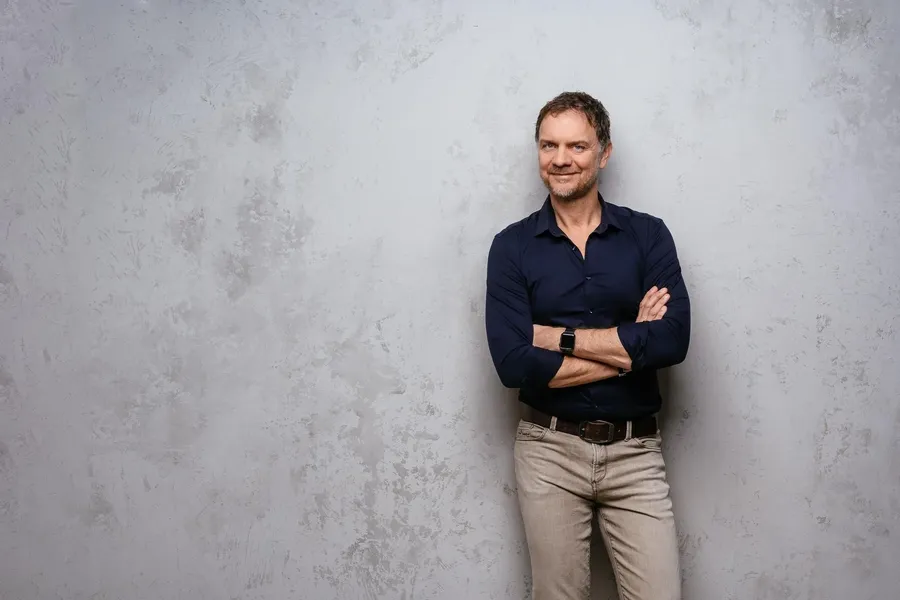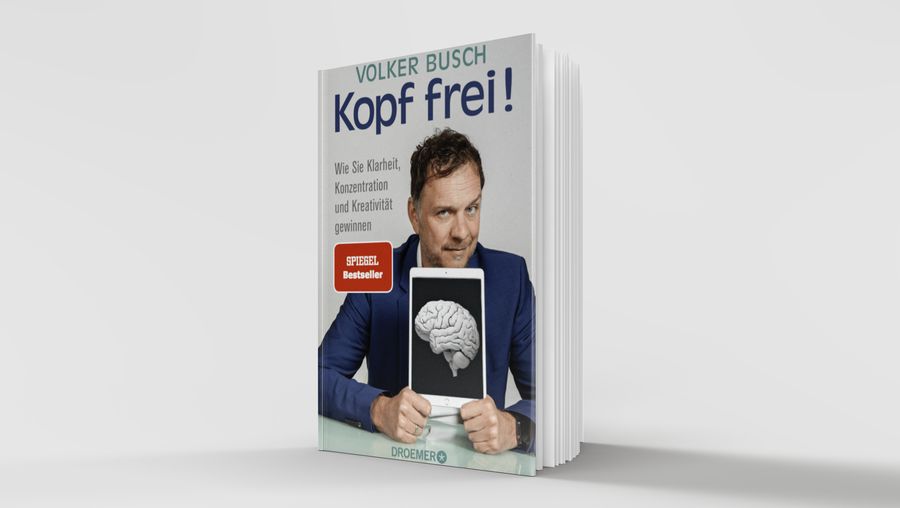Interview with Prof. Dr. Volker Busch
"Who declutters their brain becomes attentive to what is truly important."
Prof. Dr. Volker Busch is a doctor, scientist, author, and well-known keynote speaker. For 20 years, he has been exploring the world of mind and brain. His new book "Kopf frei!" has just been released by Droemer Verlag and has been in the top 10 of the Spiegel bestseller list for several weeks. In the interview, he reveals how we can clear our minds in a world overloaded with stimuli and information, and focus on what is important in life.

Prof. Dr. Volker Busch
The neurologist and neuroscientist is also a successful public speaker and bestselling author. His latest book: Clear Mind! How to Gain Clarity, Concentration, and Creativity (Droemer Verlag).
Mr. Busch, in your book you write that the flood of information is increasingly burdening people. What's going on in our society?
"The amount of information we absorb daily is constantly growing. Every year, consumption increases by more than two percent. Many of the information is directed at us: Do this! Don't miss that! Definitely check this out! And so on. An overabundance of options and offerings can distract us, confuse us, and clog our minds. The consequences are evident in terms of performance and health: Many clients tell me that they can no longer keep up at work, make mistakes, or can't remember anything. Concentration becomes increasingly difficult for them, and by the evening, they are completely exhausted from the flood of stimuli and digital work stress. Many people feel emotionally stirred, complain about negative thoughts, and can no longer relax in the evening or find restful sleep. Information does affect us, especially when we consume too much of it. Information can be beneficial, of course, if we choose wisely and absorb it thoughtfully. It's like in medicine. The dose makes the poison."
How can one better deal with information to protect oneself from sensory overload?
„The power in dealing with information lies in smart selection: Get the information you absolutely need. But then give your sensory organs and your brain short periods of rest to process the information. Don't clutter yourself with news, options, offers, tasks, and possibilities that the digital world constantly presents to you. Take a step back and always consider: Is this important now? I always recommend remembering a bouncer standing in front of a nightclub on a Saturday night. He chooses who can come in and who can't. This may initially seem unsympathetic, but it ensures that people inside don't step on each other's toes and everyone has a good evening. So, determine what you allow into your mind. And decide what you want to do without. Today, the art is not knowing where to get information from, but knowing what you can omit.“
They say that our memory also suffers from the abundance of information. How can one improve their memory?
„The problem is that our brain quickly becomes overwhelmed with the many simultaneous pieces of information as well as constant multitasking. Everything is processed superficially and nothing really sticks. By perceiving our surroundings precisely again, focusing on the essentials, and immersing ourselves in them, our memory also improves. Because when we listen carefully as someone tells us something, the neural processing depth of the sensory impressions in the brain is significantly higher. This means that we also store what we perceive better. This is something that Sherlock Holmes was particularly good at. He didn't just see his world, he looked closely. And that's how he noticed things that escape us today because we are busy with our smartphones or other things while driving or sitting in a cafe. Successful people with good memory capacity are not necessarily more intelligent, as studies have shown. However, they observe more precisely and absorb environmental impressions more strongly. When patients in middle age come to me with a fear of dementia because they feel like they can't remember anything anymore, we first work on training their attention and perception. This often improves memory as well. The French author Pierre de Levis once put it succinctly: 'Attention is the chisel of memory.'"
Not so easy in a world full of distractions. How can one maintain concentration?
"Developing concentration is best achieved by training it daily. I recommend so-called focus times of 30 or 45 minutes throughout the day, during which one consciously and exclusively devotes oneself to a single thing and gives it their full attention. The key is exclusivity; one should try to avoid disturbances and interruptions as much as possible during this time. When working with full concentration, the networks of different brain centers work better together, improving our mental performance. But our well-being and mental health also benefit from regular focus times. Several experimental studies have shown that employees who immerse themselves deeply in a task without interruptions were more satisfied with their performance at the end of the day and perceived their subjective stress as lower. So, once again, an example of how attention rewards us when we handle it carefully."
No one can concentrate for eight hours straight. What can you do when your energy fades away?
"Right. Concentration does not come to stay long. After 45 minutes, it already decreases noticeably, and after at the latest 60 to 90 minutes, it is mostly depleted. In general, the more demanding a mental task is, the more necessary regular short breaks become. As they say in music so beautifully: Without an intermezzo, no chord! It is similar in the working world. Breaks are necessary and indispensable for a focused mind. They restore our attention system. Often, 10 to 20 minutes are already sufficient. From the brain's perspective, a break is particularly valuable when we can "switch off". If possible, one should not consume digital media. Organizing emails and appointments, or communicating with the phone means a continuation of mental tension. The tasks may not be as strenuous as the concentrated work at the desk before, but they are also not completely relieving. On the other hand, if you daydream for a few minutes, let your thoughts wander, and for a brief moment forget all tasks and appointments, breaks are much more restful. Much more crucial than what you do during a break is what you leave behind during a break."
In your book you write that creative ideas come during breaks when we are not consuming information. What happens in the mind?
"That's right. It's almost magical what happens then. Our brain uses those moments without consumption to internally process the information it has previously absorbed. It connects them, organizes them, or deletes them. Through this form of associative thinking, the brain "cleans up" and often rewards us with new insights, realizations, and perspectives. During breaks, you can find the best solutions to problems. We become creative. Everyone knows this from everyday life. The best ideas don't come when you're on the phone or sitting in front of an Excel spreadsheet, but when you spend half an hour looking out the window on a train or hiking in the mountains. A lower intake of external stimuli advances constructive thinking internally. If instead, we were to watch videos or read headlines during such a break, these linking processes would stop instantly. Mental breaks of "doing nothing" are indispensable from the perspective of the creative brain. A Chinese proverb once beautifully expressed it poetically: "Only in a calm pond can the light of the stars be reflected."
What role does nutrition play in concentration?
"How fit we are in our minds largely depends on us - also on the foods we consume daily. Energy supply plays a crucial role in brain function. The more balanced and holistic we supply our body with micronutrients, such as vitamins and trace elements, which are important for our energy metabolism, the better it can work. Concentration problems, constant forgetfulness, or learning difficulties can also be signs of unbalanced nutrition. With micronutrients, we can 'feed' our nervous system and thus support our thinking and learning ability, concentration, memory, and even our creativity."
Will you also use the upcoming weekend or the Christmas season more for mental breaks and creative timeouts?
"Yes, absolutely. December is usually my favorite month for that. Unlike many people I know, the Christmas season is not very stressful for me. These are weeks where I am mostly at home, clear my mind, and review the year. I usually don't plan much and let myself drift. This way, I tidy up my mind. And with a bit of luck, the first new ideas come. And strength for the new goals that have been set for the coming year. So, I am very much looking forward to the mental spaces of the coming weeks."
Author and Book Information
For more information about Dr. Volker Busch and his lectures, please visit: www.drvolkerbusch.de
More information about the book, excerpts & video: www.kopf-frei.info
